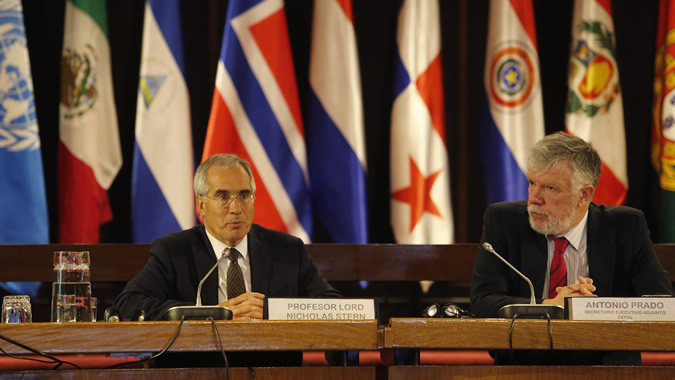Briefing note
The actions carried out in the next 20 to 30 years, especially in terms of infrastructure and energy production as a result of demographic growth and the rising rate of urbanization, will be decisive not only to avoid the devastating effects of climate change but also to slash poverty in the world, Professor Lord Nicholas Stern said during a keynote lecture on Friday, October 9 at ECLAC’s headquarters in Santiago, Chile.
“If we fail in the management of climate change, we fail in overcoming poverty,” said the British expert, who was welcomed by Antonio Prado, Deputy Executive Secretary of the Economic Commission for Latin America and the Caribbean (ECLAC).
Antonio Prado highlighted Stern’s trajectory and his contribution to the study of climate change, mentioning in particular the importance of the Stern Review on the economics of climate change, which “marked a turning point in the discussion” of this phenomenon, Prado said.
ECLAC’s Deputy Executive Secretary said that one of the main messages of the review is that the benefits of early and decisive action against climate change largely exceed the costs associated with it.
Stern, who currently chairs the Grantham Research Institute on Climate Change and the Environment and the Centre for Climate Change Economics and Policy (both at the London School of Economics and Political Science), analyzed during the lecture some of the policies that should be carried out urgently to avert an increase of more than 2°C in the planet’s temperature.
Stern, who is also president of the British Academy, was optimistic about achieving an agreement at the next Conference of the Parties of the United Nations Framework Convention on Climate Change (COP21), which will be held in December in Paris, although he recognized that there is no certainty regarding how substantial it will be. “We have learned a lot since the COP15 in Copenhagen in 2009,” he said.
Paris should be considered the first of many steps and an occasion to forge greater understanding not only of the threats and risks of climate change but also of the opportunities related to the transition towards a low-carbon economy, Stern said.
In this framework, Latin America and the Caribbean, one of the most urbanized regions in the world, must focus its efforts on the use of renewable energies and the sustainable management of forests, he added.



